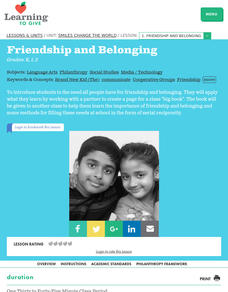University of Minnesota
Dendritic Spines Lab
This is your brain on drugs ... literally! Your neuroscientists-in-training examine the evidence of drug use on the human brain and how neurons change their connectivity when altered by drugs. They then work together to create testing...
Curated OER
The Civil War Through a Child's Eyes
Pupils focus upon the Civil War era using research methods of drawing information from primary sources. Literature and photographic images reflect, communicate, and influence human perspectives of historical events. The lesson helps...
Curated OER
Recalling History by Pulling Strings
Students investigate the role and nature of story-telling as it preserves history and culture and discuss how puppetry serves as an effective method of presentation. They create basic outlines for puppet shows that relay important...
Curated OER
Smiles Change the World
Students explore ways to notice when others are sad, happy, calm, or angry. They act out feelings and have others try to identify them. The listen to The Brand New Kid, focusing on plot, characterization, and illustrations. They create a...
Curated OER
Pueblo Pottery
Students are introduced to the characteristics of pueblo pottery and create their own piece of pueblo inspired pottery. After a brief lecture into the history and methods creating pueblo pottery, students use provided materials to create...
Museum of Tolerance
Developing Media Literacy
To protect young people from questionable content, many schools limit access. This resource suggests that because learners can so readily avail themselves to unrestricted Internet access, it is vital for 21st century...
Curated OER
Writing Folktales
Students consider the structure of folktales. In this writing skills instructional activity, students list the attributes of folktales that they read in class. Students then complete handouts based on the elements of the tales as well as...
National Endowment for the Humanities
Folklore in Zora Neale Hurston's Their Eyes Were Watching God
Learners define folklore, folk groups, tradition, and oral narrative. They identify traditional elements in Their Eyes Were Watching God Analyze and understand the role of traditional folkways and folk speech in the overall literary...
Curated OER
The Ballad of the Sad Café
Learners view the film "The Ballad of the Sad Cafe" and analyze it for stereotypes of mountain and hillbilly communities. They identify and discuss Appalachian values represented in the film and write a report on their observations.
Curated OER
The Automobile
Students are introduced to technological innovations that contributed to mass production of the automobile and how this allows large numbers of Americans to afford an automobile.
Curated OER
Corrosion/Conservation/Preservation
Students examine the reasons why metal corrodes in regard to metal artifacts. In groups, they discover the affects of salt water on metal and compare the type of corrosion found on iron. They also research the types of metal...
Curated OER
History of Water Use in Hawaii
Students research water use in Hawaii and use primary and secondary sources to determine the impact of restoration of the L?l?kea stream on stream flow, water quality, habitat and biota.
Curated OER
Anger (Part 1): Identifying Our Style
Students identify the two common sources of anger. In this psychology lesson, students discuss productive ways to express anger. They complete a reflection worksheet at the end of the lesson.
Stanford University
Stanford Encyclopedia of Philosophy: Descartes' Epistemology
This site is a discussion of Descartes influential epistemological problems. Addresses Descartes' characterization of knowledge, his methods, his major arguments and mistakes, and his most enduring contributions to modern philosophy....













